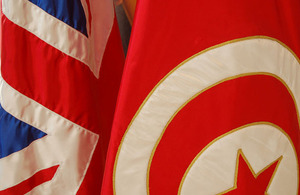Promoting Public Governance’s Transparency and Integrity in Tunisia
The UK is supporting reform in Tunisia’s public governance

The UK was pleased to support a high-Level conference to promote transparency and integrity in Tunisia’s public governance that was held on 19 -21 June in Tunis.
The event was funded by the British Embassy in Tunis and organised by the Organisation for Economic Co-operation and Development (OECD), and aimed to build on Tunisia’s initiatives to improve the fiscal transparency and develop a code of ethical conduct for its public agents and high-level officials.
The conference participants came from across the MENA region and OECD countries, and used the opportunity to discuss ways to improve the transparency of public financial management, governments’ integrity and best practices to increase citizens’ participation in public policy decisions.
Over the course of the first two days, the participants looked at case studies and experiences from Belgium, Brazil, Lebanon, Palestinian Authority, South Africa and Turkey. On the last day of the conference, Tunisia’s Prime Minister Ali Laarayedh and OECD Deputy Secretary General Richard Boucher joined the discussions on Tunisia’s recent progress in promoting fiscal transparency. They also discussed the prospects for rebuilding trust between Tunisian citizens and the State.
Speaking at the event, Louise Burrett, Chargée d’Affaires at the British Embassy said “anti-corruption and transparency are global priorities for the UK under its G8 Presidency. We recognise Tunisia’s political will to instil good governance through its institutions. This gives me confidence that, with time and our joint continued commitment, accountable and transparent practices will flourish within Tunisian state institutions”.
The conference was the result of cooperation between the OECD and the Tunisian government over the past twelve months in the following areas: a) the development of a code of conduct for public officials, b) evaluation of the control system and audit within the public sector, c) reform of the declaration of assets, and d) strengthening fiscal transparency.
The conference is part of wider efforts of the UK’s Arab Partnership Programme with a total budget of £2.5 million (over 6 million TND) this year to support the democratic transition in Tunisia.
The UK is one of the first members of the OECD which is an international economic organisation of 34 countries founded in 1961 to stimulate economic progress and world trade.
The organisation is a forum of countries committed to democracy and the market economy, providing a platform to compare policy experiences, seek answers to common problems, identify good practices and co-ordinate domestic and international policies of its members.
For more information
· Check our Arab Partnership Page
· Contact the Arab Partnership Team
· Stay informed by liking our Facebook Page and/or following us on Twitter.